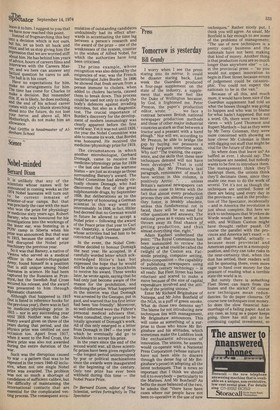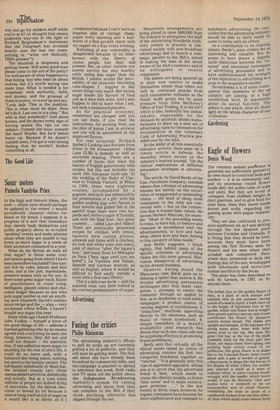P ress
Tomorrow is yesterday
Bill Grundy
I worry when I see the press staring into its mirror. It could be disaster staring back. Last week the Guardian produced a four-page supplement on the state of the industry, a supplement that made me feel like the Duke of Wellington because, by God, it frightened me. Peter Preston, the paper's production editor, wrote: " . . . we face a contrast between British national newspaper prOduction methods and those of other major industrial countries as stark as that between a tractor and a peasant with a hand plough." Nor will we, according to Mr Preston, be able to bridge the gap by buying our peasants a Massey Ferguson sometime soon. Why not? "The training, the experience, and the skills that these new techniques demand will not have been developed." That is cold enough. But Mr Preston's last paragraph, reminiscent of much I have written in this column, is positively Arctic: ". . . unless Britain's national newspapers can somehow come to terms with the fact that almost every production process they use, almost every skill they foster, is bleakly obsolete, unless this fundamental rot is faced, there will be no need for other questions and answers. The national press as it exists will have thrown away its final chance of getting production, and thus almost everything else, right."
Adam Raphael underlined the point: "The Royal Commission has been summoned to review the industry at what could be called the twilight of the Caxton era. Facsimile printing„ computer setting, photo-composition — the capability of publishing newspapers using twentieth century technology — is all ready. But Fleet Street has been reluctant and scared to make a move because of the size of capital expenditure involved and the attitude of the printing unions."
Enter Mr Richard Briginshaw of Natsopa, and Mr John Bonfield of the NGA, in a puff of green smoke. What do those two demons. say? The blame for not introducing new techniques lies with management, Mr Briginshaw announces. This will come as something of a surprise to those who know Mr Briginshaw and his attitudes, which sometimes make the Luddites look like enthusiastic advocates of innovation. The unions, he asserts, would co-operate with a National Press Corporation (whose nature I have not been able to discern through the dense fog of Mr Briginshaw's prose) in adopting all the latest techniques. That is news so important that I think we should tell it to everybody — particularly to the Marines. And Mr Bonfield? As befits the more balanced of the two, he admits that "there have been cases where our people have not been co-operative in the use of new
techniques." Rather nicely put, I think you will agree. As usual, Mr Bonfield is fair enough to see some of the problems of management: "The use of new techniques is a pretty costly business and the nationals have not been making that kind of money. Another thing is that production runs are so much longer than anywhere else" — i.e., in the provincial press — "so you would not expect innovation to begin in Fleet Street because errors of judgement could be catastrophic. You could not expect the nationals to be in the van."
Because of all this, and much more, it would have been nice if the Guardian supplement had told us what the bosses thought was going to happen and who was to blame for what hadn't happened. But not a word. Oh, there were two interviews — with Lord Thomson and Rupert Murdoch — but as they were by Mr Terry Coleman, they were more concerned with showing us how clever Mr Coleman is than with digging out stuff that might be vital for the future of the press.
So where does that leave us? As baffled as ever, I should say. The techniques are needed, but nobody wants to be first to introduce them. The management think they'll bankrupt them, the unions think they'll decimate them, since they enable one man to do the work of several. Yet it's not as though the techniques are untried. Some of them are being used every day in the provinces — and in the production of The Spectator, incidentally — and in America the revolution is just about complete. But here we stick to techniques that Wynken de Worde would have been at home with, and William Caxton might have thought rather passe. Of course the parallel with the provinces and America isn't exact — it isn't all that helpful, actually — because most provincial and American papers are in a monopoly position, and they can take risks in the near-certainty that, when the dust has settled, their readers will still be queueing there, even more eager to hand over money for the pleasure of reading what a terrible state the world is in.
But surely there is something Fleet Street can learn from the States and the sticks? Of course new techniques mean redundancies. So do paper closures. Of course new techniques cost money. So does the slow financial haemorrhage of a failing paper. And in any case, as long as a paper keeps going, there has still got to be continuing capital investment, so why not go for modern stuff while you're at it? (A thought that seems positively way-out in the light of Richard Briginshaw's statement that the Telegraph has invested heavily over the last ten years, putting in "what are basically 1930's presses"!) The situation is desperate and getting worse. Will some good man' please come to the aid of the party? I'm well aware of what happened to that boring boy who kept on about wolves, but it's worth saying one more time. What is needed is for somebody with authority, faith, and money, and the greatest of these is money, to stand up and say, "Look lads. This is the position. This is what must be done. Now let's do it. Last one in is a cissy." But who is that somebody? God alone knows, and He shows every sign of having sealed His lips on the subject. Cometh the hour, cometh the man? Maybe. But he'd better hurry up. Because if he doesn't cometh soon, I've got a very strong feeling that he needn't bother comething at all.



































































 Previous page
Previous page